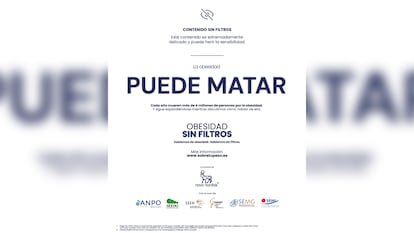‘Obesity can kill’: Controversial campaign by Ozempic drugmaker sparks backlash
Novo Nordisk’s campaign, which aims to speak ‘without filters’ by declaring obesity a disease, has been strongly criticized on social media: ‘It’s indecent’

“This content is extremely sensitive and may offend sensibilities,” warns a campaign by the pharmaceutical company Novo Nordisk plastered on bus shelters throughout Madrid. Immediately below, in capital letters, the poster emphasizes that obesity is “a disease” and that it “can kill”: “It’s a health problem, not an esthetic one. And it keeps spreading while we argue about how to talk about it,” concludes the ad by Novo Nordisk, the company that makes the blockbuster anti-obesity drug Ozempic. It’s a campaign that — just as it warned — has caused a stir.
The campaign has faced strong criticism both on the streets and from some scientific societies that initially supported it. “It’s indecent”; “A covert advertising campaign”; “A horrible and tasteless message,” commented users on social media, while also criticizing Novo Nordisk’s role and its commercial interests in obesity treatment. The company claims it wants to “speak without filters,” but for a few hours it removed part of the campaign from social media, along with critical comments, and also took down some posters from the streets (although it says this was part of the planned rollout).
Alongside the ads on the bus shelters, the campaign — endorsed by an association of people with obesity and several scientific societies — also includes a video that mimics a kind of TV game show. When the host asks the contestant, an overweight woman, to complete the sentence “obesity increases…,” she replies, “the capacity for self-acceptance.” He responds by saying, “it also increases the risk of heart disease” and lists other negative aspects of the condition. In the end, the contestant admits the limitations obesity causes her: “not being able to play with my children,” “feeling ashamed when I eat in front of others.” She concludes: “Obesity is a disease.” On social media, users have also attacked the video, calling it fatphobic.
La obesidad es… no poder correr cuando pierdes el autobús, cuando quieres jugar con tus hijos. Es sentirse mal por el mero hecho de comer.
— Novo Nordisk España (@NovoNordiskES) June 17, 2025
La obesidad es una enfermedad. Hablemos de #ObesidadSinFiltros pic.twitter.com/k3a1WyA9fZ
The controversial campaign has once again stirred a contentious topic: the debate about the social perception of obesity, fatphobia, and the place of body positivity culture in the Ozempic era.
“It’s necessary to remove filters from the conversation around obesity because obesity doesn’t require protection; it requires knowledge to act on it and seek medical help, as we do with any other chronic illness,” said a Novo Nordisk spokesperson.
They emphasized that it is “urgent to talk about obesity as a chronic illness that can kill.” “We want to distance obesity from esthetic or body-positive trends so that there is a real social awareness of the importance of going to the doctor,” they said.
When asked about the controversy, the same spokesperson simply pointed out that all the entities involved in the campaign are “aware that this is a disruptive initiative that may provoke all kinds of reactions,” and has scheduled a press conference next week to “listen to all parties involved,” where they will explain “the reasons behind the launch” of the initiative, they indicated.

Yesterday, the company temporarily deleted the controversial video from its X (formerly Twitter) and Instagram profiles, where some users had already posted critical comments about the ad. A spokesperson for the pharmaceutical company said it was a “temporary measure” to modify “one of the references for purely technical reasons.” In the afternoon, they reposted the video on their social media, but it no longer included the numerous previous criticisms.
On Bluesky, alongside a photo of the poster, Spanish lawyer Paloma Llaneza strongly criticized the campaign: “It’s indecent: it uses the anti-woke style of ‘let’s talk about this problem that the woke call respect for other people’s bodies’ [...] with the excuse of fighting the disease of obesity because advertising prescription drugs to the general public is prohibited.”
This was not the only time the word “woke” has appeared in the debate. Another user on X used it to defend the ad: “A campaign based on Health Promotion and unafraid of the prevailing wokism.”
Andrea Ciudin, a member of the board of the Spanish Society for the Study of Obesity (SEEDO), one of the scientific groups that endorsed the campaign, explains that the final result was not what they expected when the initial proposal was evaluated.
“The initial idea wasn’t bad, but seeing it the way it finally turned out has caused me concern,” says Ciudin, head of the Comprehensive Obesity Treatment Unit at Vall d’Hebron Hospital in Barcelona. “We added some stigmatization, and that wasn’t the idea. Awareness campaigns need to go in a different direction, not with ads like this. I think this will achieve the exact opposite of what was intended because it’s very aggressive and violent. It’s going to provoke backlash.”
Ciudin adds that SEEDO executives have already met with Novo Nordisk to request changes to the campaign.
Hablar sin filtros, sorprende. Incluso en esta red. La conversación sobre obesidad está cargada de filtros que nos llevan a una realidad distorsionada que afecta a la salud y la vida de quienes viven con ella. Hablemos de #ObesidadSinFiltros | https://t.co/9T5hezxc3a pic.twitter.com/mGKYpZkg5u
— Novo Nordisk España (@NovoNordiskES) June 11, 2025
A spokesperson for the Spanish Society of General Practitioners (SEMG) — another organization that supported the Novo Nordisk initiative — points out that it is the World Health Organization (WHO) that “classifies obesity as a disease and warns of the serious consequences it has for health.” “That’s why we said at the [recent] congress that it’s not an esthetic problem,” they explain.
@alicewonderbear Una publicidad sobre la obsesidad que está hecha con “LA INICIATIVA” de NovoNordisk, que son quienes están detrás del medicamento Ozempic/Mounjaro… En vez de ayudar a combatir sobre algo que muchas personas tienen con buenos hábitos saludables y deporte … quieren que te inyectes algo que a día de hoy se está sabiendo que causa ceguera, no puedes comer ni beber, te hace inmune si algún día te haces diabetico… VAYA, VAYA. No cedáis a este tipo de cosas, por favor.
♬ sonido original - alicewonderbear
In her criticism, Llaneza also points out that the protagonist of the ad is “a young woman, their target,” rather than a man. Obesity is a growing health problem for both men and women, although it is slightly more prevalent in males: according to the Spanish Ministry of Health, 16.5% of men and 15.5% of women in Spain have obesity.
The danger of trivializing drugs
Much of the criticism of the campaign is directed at Novo Nordisk, due to the potential commercial benefit of such initiatives. The more people seek medical help to lose weight, the more doctors will prescribe the drugs the company manufactures.
While neither the controversial campaign nor the website it links to — called La verdad de su peso (The Truth About Your Weight), which provides information about the effects of obesity and how to control the condition — mention anti-obesity drugs, the site does offer an app to calculate the body mass index (BMI), a parameter considered outdated by many specialists but which serves as the basis for prescribing anti-obesity medications, according to regulatory agencies. Regarding how to combat obesity, the website only includes recommendations and advice on diet and healthy lifestyle habits.
Ciudin believes the campaign and the website with the BMI calculator are “inappropriate”: “On that webpage, Novo Nordisk promotes self-calculation of BMI for self-diagnosis. We, in the scientific community, do not agree with the use of BMI for the diagnosis of obesity. We advocate for a comprehensive approach based on shared decisions and patient empowerment. We want to give people tools to empower themselves; not to diagnose themselves, but to know what to do after diagnosis.”
Ciudin also makes clear her position on medications and recalls that, when they discussed pharmacological treatment for obesity at their congress, they underscored that “it is recommended as part of a comprehensive approach that includes lifestyle changes, with the adoption of a healthy diet and increased physical activity.” “Our experts emphasized that although these are prescription medications, their use is becoming popular and, to some extent, trivialized, which could pose health risks,” she adds.
Ciudin stresses that at the congress it was strongly emphasized that these drugs should be prescribed “by specialized professionals,” when authorized conditions are met, “with strict medical supervision and monitoring, within the healthcare system.”
“SEMG representatives pointed out that no medication is harmless, especially in people who do not have diabetes or obesity,” says Ciudin. “Among the side effects described in the product data sheet, the main and most frequent are nausea, vomiting, and other digestive disorders.”
The Spanish Agency for Medicines and Medical Devices (AEMPS) recently issued a warning after detecting a “very rare” adverse ocular reaction in patients treated with semaglutide — the active ingredient in drugs like Ozempic and Wegovy — known as non-arteritic anterior ischemic optic neuropathy, which can lead to sudden vision loss. The AEMPS insists that the frequency of this condition linked to the use of these drugs is “very low.”
Sign up for our weekly newsletter to get more English-language news coverage from EL PAÍS USA Edition
Tu suscripción se está usando en otro dispositivo
¿Quieres añadir otro usuario a tu suscripción?
Si continúas leyendo en este dispositivo, no se podrá leer en el otro.
FlechaTu suscripción se está usando en otro dispositivo y solo puedes acceder a EL PAÍS desde un dispositivo a la vez.
Si quieres compartir tu cuenta, cambia tu suscripción a la modalidad Premium, así podrás añadir otro usuario. Cada uno accederá con su propia cuenta de email, lo que os permitirá personalizar vuestra experiencia en EL PAÍS.
¿Tienes una suscripción de empresa? Accede aquí para contratar más cuentas.
En el caso de no saber quién está usando tu cuenta, te recomendamos cambiar tu contraseña aquí.
Si decides continuar compartiendo tu cuenta, este mensaje se mostrará en tu dispositivo y en el de la otra persona que está usando tu cuenta de forma indefinida, afectando a tu experiencia de lectura. Puedes consultar aquí los términos y condiciones de la suscripción digital.









































